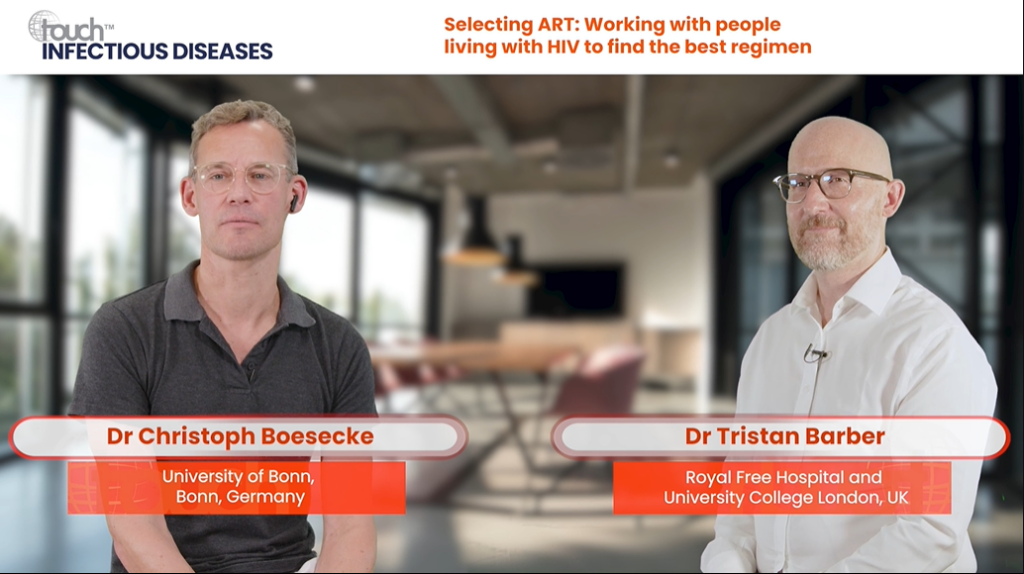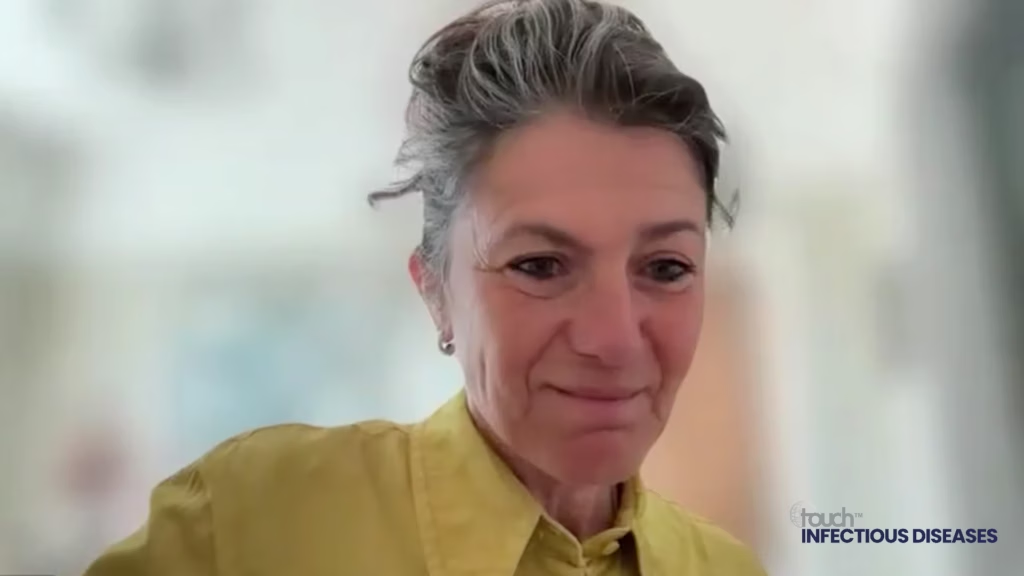



Polish up: What’s new in diagnosing and treating onychomycosis
Onychomycosis is one of the most common nail conditions seen in clinical practice, yet diagnosis is often uncertain and treatment failures are frustratingly common. In this episode, Dr Shari Lipner shares practical updates on smarter diagnostics, existing & emerging therapies, and what we need to know about how to manage this condition today and in the future.
Expert voices on the future of HIV prevention: Highlights IAS 2025
The International AIDS Society Conference 2025 (IAS 2025) brought together global leaders in HIV science, policy, and community advocacy against a backdrop of funding crises and scientific breakthroughs. In Kigali, Rwanda, one theme rang clear: innovation alone isn’t enough. Delivery, access, and equity must catch up with the science. We spoke with leading experts and advocates to ask: What single development at IAS 2025 will have the greatest impact on HIV prevention or care going forward? Their answers capture the momentum, and the challenges, that will shape the next era of the global HIV response.
PURPOSE 1 & 2: lenacapavir safe and effective for HIV PrEP in young populations
In this interview we spoke with Dr Katherine Gill (The Desmond Tutu HIV Centre, University of Cape Town, Cape Town, South Africa) around the advantages of a long-acting therapy, the efficacy, safety and PK profile of lenacapavir, and the practical considerations for integrating lenacapavir into HIV prevention programmes in younger populations.
Rare pneumonic plague-related death sparks health advisory
A patient in the United States has recently died after contracting pneumonic plague, a rare but highly serious form of the disease caused by the bacterium Yersinia pestis, according to a statement from the Coconino County Health and Human Services (CCHHS).1 This is the first confirmed plague-related fatality in the county of Arizona in several years and has prompted increased public health monitoring and community awareness efforts.
01. Polish up: What’s new in diagnosing and treating onychomycosis
02. Expert voices on the future of HIV prevention: Highlights IAS 2025
03. PURPOSE 1 & 2: lenacapavir safe and effective for HIV PrEP in young populations
04. Rare pneumonic plague-related death sparks health advisory

Onychomycosis is one of the most common nail conditions seen in clinical practice, yet diagnosis is often uncertain and treatment failures are frustratingly common. In this episode, Dr Shari Lipner shares practical updates on smarter diagnostics, existing & emerging therapies, and what we need to know about how to manage this condition today and in the future.

Physician burnout is at a critical point. In this episode, Nicky speaks with Dr Alfred Atanda about why so many physicians are burning out and what can be done to change the trend. From personal experience to system-wide solutions, Dr Atanda shares valuable insights on improving physician well-being and building a more effective healthcare culture.

In this episode, we explore the future of continuing medical education (CME) with the team behind touchIME. Hannah Fisher and Matthew Goodwin share insights into global and US trends, the importance of patient inclusivity and how educational outcomes are evolving to better measure the direct impact of learning on clinical practice and patient care.

A double-stranded DNA virus of the Orthopoxvirus family, mpox (formerly monkeypox), continues to infect people daily, following the 2022 global outbreak.1 Two clades (clade 1 and clade 2) have been identified, with the 2022 outbreak caused by a subclade of clade 2, referred to as ...

Sponsored content from GSK. Watch leading experts Jeremy Szeto and Kristen Robillard discuss their personal experience with adult immunization programs and the approaches they use in their practices to help optimize adult immunization rates.

Want to be featured in touchReviews in Infectious Diseases?
Share your knowledge, influence clinical practices and enhance patient care in Infectious Diseases today!
- Peer-reviewed, free-to-access
- Accepting reviews, research and editorials
- No article processing fees
- Digital features and plain language summaries
- Multichannel content distribution for maximum visibility

Welcome to the latest edition of touchREVIEWS in Infectious Diseases, where we continue our mission to deliver insightful, cutting-edge perspectives in infectious disease diagnosis and management. This issue offers an array of topics spanning diagnostics, service delivery innovations and preventive ...

In this episode, we explore how point-of-care testing is transforming the management of sexually transmitted infections (STIs). Joined by Dr Libby van Gerwen, we discuss the rising global STI rates and the role these innovative tests play in addressing the issue. We also explore the challenges current point-of-care tests face and how next-generation advancements could further transform the future of STI diagnosis and treatment.

Highlights Determining infection and multidrug resistance (MDR) rates continuously helps to detect the problem to be solved, including outbreaks. Cleaning and disinfection play an important role in preventing MDR and evaluating and correcting the process for better results. MDR control ...

Two experts discuss best practices for antiretroviral therapy (ART) selection for people living with HIV.





Watch three experts describe the HIV life cycle, the rationale for ART and how to manage ART resistance.





The expansion of HIV treatment access during the past two decades, particularly in low- and middle-income countries, stands as a significant accomplishment in the field of public health.1 Currently, there are an estimated 30 million people on antiretroviral treatment for HIV ...

Respiratory syncytial virus (RSV) is often of increased concern in the autumn and winter months, especially for women who are pregnant, or those with newborns.1 Worldwide, RSV is the second leading cause of death (second to malaria) in children during ...

Vaginal symptoms are one of the most common reasons for women accessing acute healthcare in the USA.1 Vaginitis is most commonly evaluated based on clinical observations, including assessment of discharge characteristics, vaginal pH and, in some settings, microscopic examination of ...

We are excited to introduce the latest edition of touchREVIEWS in Infectious Diseases. Our mission is to bring you thought-provoking interviews, reviews, editorials, case studies and original research within the realm of infectious diseases. We aspire to engage infectious disease ...

The treatment of people with HIV (PWH)/hepatitis B virus (HBV) co-infection, especially those who have additional comorbidities requiring multiple drug therapies can be problematic. Bictegravir/emtricitabine/tenofovir alafenamide (BIC/FTC/TAF) is a co-formulated medication consisting of two components ...

By sharing, listening and gaining an understanding of the real-life experiences of individuals living with a condition, clinicians and patients can better work together to improve care and outcomes and shape the healthcare system and policy of the future. Patient ...

Despite being the most severe form of viral hepatitis, there is no FDA-approved therapy for chronic hepatitis delta (CHD).1 Patients with CHD can progress to cirrhosis, as early as 5–10 years after infection. Further complications can also develop, such as esophageal ...
Editorial Board
Introducing the Editorial Board of touchREVIEWS in Infectious Diseases, who support our mission to advance medical knowledge and practice by ensuring the integrity, relevance, and impact of the content we publish. Together, we strive to foster a vibrant academic community and contribute to the continuous improvement of healthcare worldwide.

Amesika Nyaku
Newark, NJ, USA
HIV

Amesika Nyaku
Editor-in-Chief
Assistant Professor, Division of Infectious Diseases, Rutgers New Jersey Medical School, Newark, NJ, USA
Biography
Amesika Nyaku, MD MS is an Assistant Professor in the Division of Infectious Diseases at Rutgers New Jersey Medical School and a physician-scientist. She provides clinical care for people living with HIV or other infectious diseases and substance use disorders. Her research interests lie at the intersection of HIV and substance use disorders. She focuses on 1) evaluating long-acting therapeutics for HIV and opioid use disorder, 2) the implementation of integrated care models for HIV and substance use disorders to improve health outcomes, and 3) increasing the inclusion and participation of racial/ethnic minorities in clinical trials research. She is also co-director of the Northern New Jersey Medication-Assisted Treatment Center of Excellence that is tasked with assisting the state in expanding access to medication-assisted treatment for opioid use disorder through education, novel service delivery and community collaboration.

Nyuma Mbewe
Editorial Board Member

Nyuma Mbewe
Zambia, Africa
HIV and Policy

Nyuma Mbewe
Editorial Board Member
Infectious Diseases Physician, General Practitioner, Ministry of Health of Zambia, Africa
Case Management Specialist, Zambia National Public Health Institute, Zambia, Africa
Biography
Dr Nyuma Mbewe is a specialist in Internal Medicine and Infectious Diseases (Mmed-ID)
Amesika Nyaku
Editor-in-Chief


Dariusz Hareza
Dariusz Hareza

Dariusz Hareza
Chicago, IL, USA
Antimicrobial Resistance

Dariusz Hareza
Dariusz Hareza
Assistant Professor of Medicine (Infectious Diseases), Northwestern University Feinberg School of Medicine, Chicago, IL, USA
Biography
Dr Dariusz Hareza is Assistant Professor of Medicine (Infectious Diseases) at the Northwestern University Feinberg School of Medicine, Chicago, IL, USA. He is working with mentors to research antimicrobial resistance (AMR). He is also a fellow at the NIH-funded Antibacterial Resistance Leadership Group (ARLG) and recently finished an infectious diseases fellowship at Johns Hopkins University, Baltimore, MD, USA, where he received a master’s degree in clinical investigation. His research involves the molecular epidemiology and clinical outcomes in extended-spectrum beta-lactamase producing Enterobacterales and difficult-to-treat Pseudomonas aeruginosa.
Nyuma Mbewe
Editorial Board Member


Jon Salmanton-García
Editorial Board Member

Jon Salmanton-García
Cologne, Germany
Fungal & Respiratory Infections

Jon Salmanton-García
Editorial Board Member
Postdoctoral Researcher and Project Manager, University Hospital of Cologne, Cologne, Germany
Biography
Dr. Jon Salmanton-García is a researcher specializing in infectious diseases in immunocompromised patients, with a particular focus on respiratory viral infections in hematology and fungal diseases. He holds a PhD in Health Sciences from the University of Cologne and has published numerous scientific articles while presenting his work at national and international congresses. He serves as the scientific coordinator of the EPICOVIDEHA registry, which investigates respiratory viral infections in hematological patients, and leads the Diagnostic and Treatment Capacity of Invasive Fungal Infections initiative. Additionally, he has held leadership roles in European medical associations, contributing to advances in infection management for vulnerable populations.
Dariusz Hareza
Dariusz Hareza


Amesika Nyaku
Editor-in-Chief

 touchINFECTIOUS DISEASES
touchINFECTIOUS DISEASES
Register Now!
Explore the latest in medical education and stay current in your field. Create a free account to track your learning.
- Save your progress for video
- Keep track of your CME credits
- Add personalised learning notes
- Receive updates from course leaders and faculty
- Be the first to hear about new and exciting interactive learning opportunities
Latest articles videos and clinical updates - straight to your inbox
Log into your Touch Account
Earn and track your CME credits on the go, save articles for later, and follow the latest congress coverage.
Register now for FREE Access
Register for free to hear about the latest expert-led education, peer-reviewed articles, conference highlights, and innovative CME activities.
Sign up with an Email
Or use a Social Account.
This Functionality is for
Members Only
Explore the latest in medical education and stay current in your field. Create a free account to track your learning.




